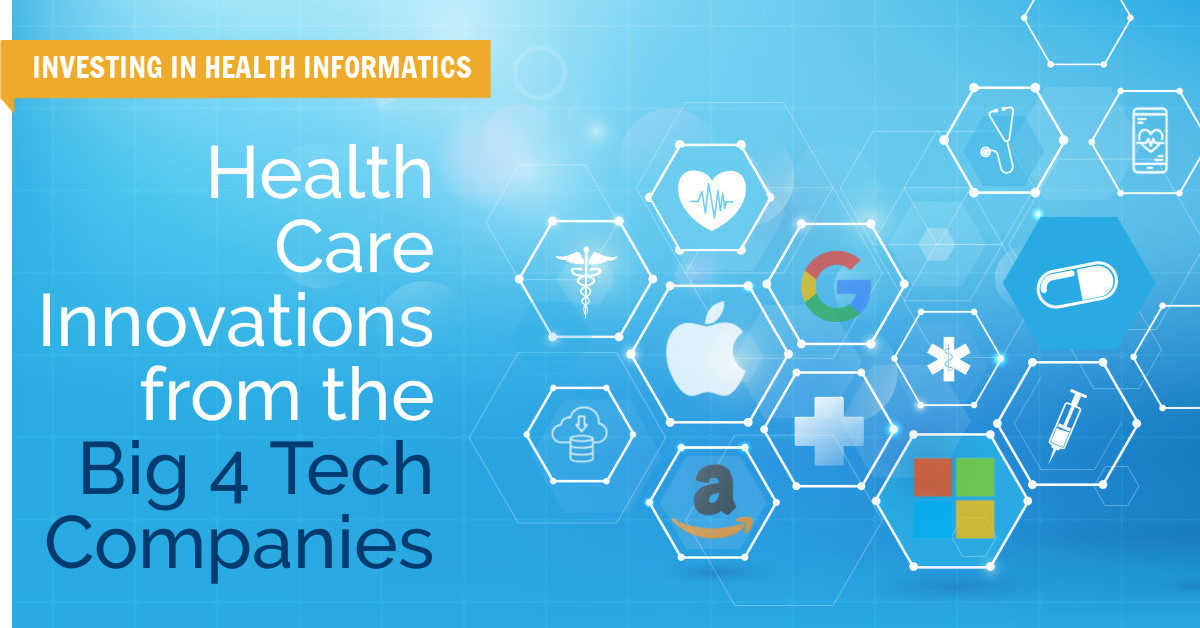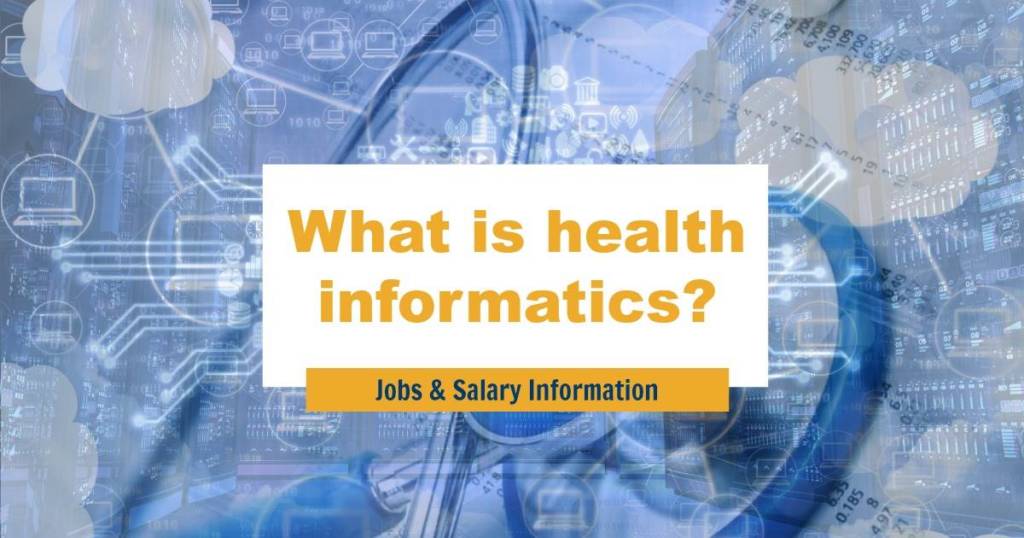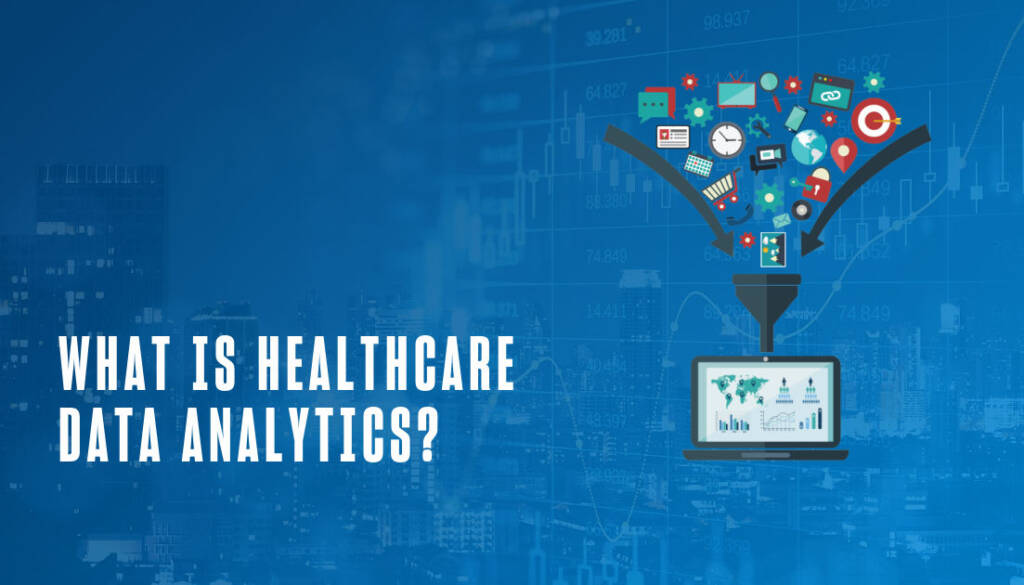With its incredible potential to use data to transform the practice of medicine and the delivery of care, the science of informatics continues to drive health care innovation.
Today, the vital signs of the growing health informatics market appear stronger than ever, thanks to substantial investments being made by some of the world’s biggest and best-known tech companies.
Apple, Amazon, Google, Microsoft. Each of these tech giants is not-so-quietly expanding its reach into the health care sector, strategically looking to capture a large slice of the more than $3 trillion that the United States spends on health care each year.
One high-profile example of this is the news that Google has purchased Fitbit, the makers of wildly popular fitness apps and wearable devices, for a reported $2.1 billion. In a blog post announcing the move, Rick Osterloh, Google Senior Vice President, Devices & Services, said it is likely that the company will “introduce [more] Made by Google wearable devices into the market.”
Though Google is obviously heavily invested in innovative ways to monetize structured data, the company also acknowledged widespread sensitivity around issues of personal data privacy with Osterloh’s assurance that “Fitbit health and wellness data will not be used for Google ads.”
Overall, research firm CB Insights reports that 10 of the largest U.S. tech companies were involved in health care equity deals worth over $2.7 billion in 2017, up from $277 million for all of 2012. This is certainly good news for the overall health of the masses. But it also expands the landscape of career opportunities for professionals who possess key health informatics skills.
Here is a closer look at how Big Tech is shaking up the health informatics landscape with ambitious projects and massive investments, and what these health care innovations and initiatives mean for patients, as well as for current and future health informatics professionals.
[RELATED] Health Care Analytics: How the Data Revolution is Transforming Medicine >>
‘Big 4’ Making Major Investments in Health Care Innovation
“Each of the Big 4 tech companies are seeking to emerge as leaders in healthcare, leveraging their core business strengths,” reports HealthcareWeekly.com. “Google in data, Apple in consumer devices, Amazon as an online-retail giant, and Microsoft as a trusted leader in healthcare IT.”
The article (“How the ‘Big 4’ Tech Companies Are Leading Healthcare Innovation”) explains that, “Not only are the top tech companies seeking to innovate the industry, they’re seeking partnerships, talent, and minds to aid in the fight to emerge as the champion of healthcare.”
Just as data is driving growth in the field of health informatics, it is also at the heart of many health care innovations on the part of the top tech companies. According to IBM Watson, the amount of medical data is expected to double every 73 days by 2020, with each person generating enough health data in their lifetime to fill 300 million books.
Therefore, the work of structuring and understanding this data — duties increasingly handled by health informaticists and data analysts versed in the science of informatics — is vital to the future of health care.
According to the New York Times, the so-called Big 4 are ramping up efforts to transform health care by developing and collaborating on new tools for consumers, patients, doctors, insurers and medical researchers, and by investing in health startups.
Apple
Known for its focus on consumer products that it is now leveraging in the health care space, Apple has secured one of nine spots in the FDA’s Digital Health Software Precertification Program. According to HealthcareWeekly.com, the program essentially puts the chosen companies (Verily, formerly Google Life Sciences, also made the cut) on a faster track for the approval of new health care innovations.
The Apple Heart Study, a partnership with Stanford Medicine involving some 400,000 Apple Watch owners, uses the heart rate sensors in the smartwatch to collect irregular heartbeat data and notify users of potentially life-threatening conditions such as atrial fibrillation.
Apple is also at work on smartwatch sensors that enable researchers to track Parkinson’s disease and adjust medication doses as needed. The company is also experimenting with using its iPhone X for vision tests and its AirPods for hearing tests, as well as a tool to detect speech impediments associated with stroke.
Notably, Apple has also been developing:
- HealthKit, a secure health information database that resides on the iPhone. Patients can load their electronic health record (EHR) into their phone and give permission for apps to access their patient data.
- CareKit, a toolkit for building applications that help users manage their condition and enable them to share key information with their caregivers.
- ResearchKit, an app that enables users to enroll in medical tests related to their condition. The tests generate data about specific conditions from thousands of patients that can be shared with medical researchers.
Apple is also working to streamline health care payments using Apple Pay, a service that is now offered by major insurer UnitedHealthcare.
Becker’s Hospital Review, a leading information resource for health care decision-makers, has published a series of recent posts examining the latest health-related openings at several of the top tech firms. Positions listed at Apple include:
- Clinical research scientist, health strategic initiatives (hardware): Will oversee design and execution of clinical studies.
- Senior data scientist, health (software and services): Will contribute to the team’s data analysis operations, including development of analytical, data processing and machine learning tools
- Quality assurance engineer, health (software and services): Will be responsible for modular and end-to-end testing of features and applications such as Apple’s Health, Heart and ECG app.
Amazon
Amazon, already a dominant player in the sale of medical supplies, appears to be developing a variety of strategies for entering the lucrative health care innovations market. One of these involves a possible plan to disrupt the $560 billion pharmaceutical industry, signaled by its acquisition of online pharmacy PillPack, which has mail-order licenses in all 50 states and works with Medicare plans.
In addition, Amazon, Berkshire Hathaway and JPMorgan Chase have announced a joint health care venture that involves providing their collective 1.2 million employees with technology solutions to access quality care at a reasonable cost, free from profit incentives. The fact that the venture will be collecting troves of valuable health data from more than a million patients is part of the incentive for the participating companies.
The company has also begun to sell software that mines patient medical records for information doctors and hospitals could use to improve treatment and cut costs, according to the Wall Street Journal.
Amazon is also exploring ways that its Echo home device and its Alexa virtual assistant can be used to enhance health care. The company reportedly now operates a Health & Wellness division that is working on such projects as diabetes management and care for mothers with newborn children.
Other Alexa-driven initiatives include:
- Helping the elderly manage their medications
- Improving interaction with medical facilities and caregivers
- Helping patients manage their blood pressure
- Easier handling of health insurance purchases and claims
- Offering programs and tips for a healthier lifestyle
Some analysts even regard Alexa (and Apple’s Siri) as a possible digital doctor of the future, according to MedicalFuturist.com.
Becker’s Hospital Review reports that several of the latest health-related jobs at Amazon include:
- Senior specialist solutions architect, healthcare informatics and analytics: Will provide technical design and thought leadership to the nonprofit healthcare markets for cloud computing.
- Application architect, genomics: Will assist Amazon Web Services customers in architecting, developing and re-engineering applications for the cloud.
- Program manager, healthcare: Will be responsible for quality initiatives in the medical device space and ensure adherence to external regulations and internal policies.
Google — along with its parent company, Alphabet, and its health and life sciences research division, Verily — is best known as a search and advertising powerhouse. But its focus on structured data, artificial intelligence and machine learning position it to be a major player in health care.
Now that it is turning its attention to health care innovations, the company is “betting that its (artificial intelligence) AI prowess can create a powerful new paradigm for the detection, diagnosis, and treatment of disease,” according to CBinsights.com (“How Google Plans To Use AI To Reinvent The $3 Trillion US Healthcare Industry”). Noting its strong emphasis on AI, the report asserts that “Google seems to be going after the health care space from every possible angle. For example, did you know that Google has a project to release sterilized mosquitoes to control the spread of infectious disease? Or that the company has started a limited commercial rollout of its diabetes management program? Or that it appears to be exploring insurance?”
According to Google AI, “We think that AI is poised to transform medicine, delivering new, assistive technologies that will empower doctors to better serve their patients.”
Google has also collaborated on:
- An algorithm that can diagnose diabetic retinopathy in high-quality images
- Project Baseline, a joint study of some 10,000 people that aims to establish a baseline of good health and a deeper understanding of risk factors for disease.
- A plan to move into the health insurance industry, reasoning that if it can better detect and manage disease thanks to AI, it could become an insurance company that more effectively helps patients manage risk.
Google has also been very active with health-related acquisitions and patents. Google Ventures has invested in dozens of health-related enterprises ranging from genetics to telemedicine; and Alphabet filed a reported 186 health-related patents between 2013 and 2017.
Becker’s Hospital Review reports that recent health-related jobs at Google include:
- Business director, health research and innovations: Will develop a service organization that supports research activities and develop vendor relationships.
- EHR (electronic health records) research scientist: Will design, implement and evaluate EHR models, agents and software prototypes.
- Medical imaging research scientist, health research: Will develop and analyze medical imaging model and software prototypes.
Microsoft
Microsoft, which has been partnering with U.S. health firms on enterprise technology solutions for years, has a head start as competitors Amazon and Google also ramp up their focus on the enterprise health market.
Over 25,000 U.S. health organizations reportedly use the Microsoft Azure Cloud, which according to BusinessInsider.com gives the company a clear opportunity to upsell current health care clients and forge new partnerships. In addition, Windows is the go-to operating system for many hospitals.
The company has reportedly filed for 73 health care-related patents between 2013 to 2017, primarily related to artificial intelligence and telehealth. It has also done significant work in the areas of cloud computing, cybersecurity, genomics and precision medicine.
Microsoft appears to be betting that health care will be AI-driven with Healthcare NExT, its flagship health care initiative that aims to transform care by combining research and health product development, and collaborating with industry partners.
The Microsoft Healthcare unit is a multibillion-dollar vertical for the company with its 1,100 employees and 168,000 customers. Its chief medical officer, Dr. Simon Kos, has reportedly facilitated over 14,000 partnerships with hospitals and health care institutions worldwide.
[RELATED] 5 Exciting Health Care Informatics Projects >>
How Big Tech Innovation Affects the Health Technology Career Outlook
A recent review of job listings at the Big 4 tech companies reveals a wealth of career opportunities related to health care innovation, including the following job titles:
APPLE
- Health Data Analyst
- Health Data Sciences Manager
- Senior Data Scientist – Health
- Software Quality Engineer – Health Special Projects
- Product Designer – Health Special Projects
- Visual Designer – Health Special Projects
- Biomedical Data Engineer – Health Technologies
- Senior Data Platform Engineer – Health
- Health Technology Platform Engineering Program Manager
- Data Scientist – Analytics, Health Strategic Initiatives
AMAZON
- World Wide Business Development – Healthcare
- Senior Security Consultant – HIPAA
- Global Alliance Manager, Healthcare and Life Sciences
- Senior Corporate Counsel, PillPack
- AI/ML Solutions Architect – Global Life Sciences
- Program Manager – Global Healthcare Accounts
- Healthcare Program Manager
- Academic Medical Center Sales Specialist
- Business Development Manager – Healthcare
- Clinical Data Manager (Verily Life Sciences)
- Community Manager, Project Baseline (Verily Life Sciences)
- Business Director, Health Research and Innovations
- Director, Global Communications and Public Affairs, Healthcare
Manager, Healthcare Strategy and Program Management - Marketing Platform Account Executive, Healthcare and Pharma
- Engineering Manager, Health Research
- Head of Customer Engineering, Healthcare
- Strategic Partner Development Manager, Google Health
MICROSOFT
- Healthcare Transformation Manager
- Product Manager – Health
- Director, Health Data Platform Business Development
- Connected Care & Retail Digital Health Hub Program Manager
- Healthcare Data & AI Cloud Solution Architect
- Senior Data Scientist, Healthcare AI
- Senior Program Manager – Microsoft Healthcare
The Connection Between Health Care Innovation and Health Informatics
As the explosion of medical data continues to reshape the health care industry, a similar phenomenon is sweeping the health care employment landscape — creating expanded career possibilities for those who are skilled at using health data to develop actionable insights and solve real-world problems.
But job hunters eager to land one of these exciting positions should be forewarned: Many of these exciting new high-tech health jobs require (or strongly prefer) a master’s degree.
One highly regarded advanced degree program is the Master of Science in Health Care Informatics. The program is designed for professionals from health care, health information management and information technology/computer science disciplines.
Reflective of the evolving landscape in health care innovation, USD’s MS in Health Care Informatics features two learning tracks: Health Care Informatics and Health Care Analytics. It also places significant emphasis on health care administration and strategic planning that is appealing to employers hiring for upper-level positions. Just as important, the program is designed for students who are already working full time, with the option of convenient online courses or campus-based classes that are scheduled after-hours in the evenings.





